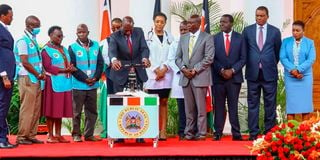Premium
Why President Ruto’s Health plan is in limbo

President William Ruto affixes the public seal during the assent of the Universal Health Coverage Bills at State House, Nairobi on October 19, 2023.
What you need to know:
- The High Court on July 12, 2024 gave orders suspending the three health-related Acts.
- The Nation has learnt that Parliament legal team has termed the 120 days untenable.
Parliament will not be able to re-enact three healthrelated Acts as directed by the High Court within 120 days, a move that now puts President William Ruto’s health agenda in limbo.
The High Court on July 12, 2024 gave orders suspending the Social Health Insurance Act, 2023, the Primary Health Act, 2023, and the Digital Health Act, 2023 for 120 days within which Parliament was directed to undertake sensitization, adequate, reasonable, sufficient and inclusive public participation before enacting the 3 Acts.
The Nation has learnt that Parliament legal team has termed the 120 days untenable saying both Houses will require at least one year to comply with the directive of the court.
Parliament legal team are said to have held a meeting a week after the ruling and told senior parliamentary leaders that if parliamentary procedures are strictly adhered as directed by the court, it will not be possible to enact the three acts within 120 days since the
The team told their bosses that legislative processes are lengthy and it ordinarily takes not less than six months to enact a law.
“It is not just possible to re-enact three laws in 120 days, our best legal teams have explored all options and they have said, it cannot work,” said a source in parliament.
According to the breakdown, since the three acts are being re-enacted, it means that the process of considering them has to start afresh starting with the sensitisation.
Public participation
Sensitisation is normally done by the policy maker in this case the ministry of health will take 45 days.
After the sensitisation process, the ministry will then send the document to parliament where for the Bill to mature, it will take 15 days as stipulated in the Standing Orders, a move that push the days to 60.
Upon maturity, the Bill will be taken to the House for first reading and committed to the relevant committee which will take at least 60 days to conduct public participation as directed by the court before bringing a report to the House.
The Bill will then be proceed to second reading and the committee of the whole House, the two processes will take another 60 days.
This means that in the National Assembly alone, the three Bills will take 160 days before being taken to the Senate for consideration.
Since the Acts require to be passed by both Houses, the senate will the same days but this time there will be no sensitization by the ministry. This means that the Bills will take 110 days in the senate bringing the number of days to 270.
Factoring recess days and other agenda that the House such as vetting of Cabinet Secretaries and the consideration of the supplementary estimates 1 that the House is racing against time to consider, the 120 days given will not be possible to achieve.
Health crisis
According to the calendar of the National Assembly, the House will proceed for its long recess on August 16 to September 9, 2024 with another short recess scheduled for October 11 to October 28.
It is important to note that the Social Health Insurance Act repealed the National Health Insurance Fund Act and would therefore create a vacuum should the Act be invalidated.
Should Parliament fail to enact the three Acts within 120 days, the Act shall stands invalidated a move which shall create a health crisis in the county with no member of the public being able to access medical services.
In the ruling the three-judge bench, comprising Justices Alfred Mabeya, Robert Limo, and Fredrick Mugambi, gave Parliament 120 days to make the necessary amendments. During this period, the acts will remain suspended.
The Court made orders that should Parliament fail to re-enact the 3 Acts, the Acts will be rendered invalid, null and void.
Parliament was directed to undertake sensitisation, adequate, reasonable, sufficient and inclusive public participation before enacting the three Acts which were unconstitutional.
In the ruling, the court cited sections 26(5) and 27(4) of SHIA. Section 26(5) makes registration and contribution a precondition for accessing public services from national and county governments or their entities.
Healthcare services
Section 27(4) stipulates that a person can only access healthcare services if their contributions to the SHIF are up-to-date and active.
The three Acts were enacted to establish the Primary Health Care Fund and the emergency, chronic, and critical illness Fund
Last week Health PS Harry Kimtai while appearing before the National Assembly Health committee urged parliament to allocate the ministry Sh100 million in supplementary budget for the sensitisation of Social Health Insurance Act
The judges stated that these sections could not withstand constitutional scrutiny because they did not make exceptions for the right to emergency medical services, thus violating Article 43 of the constitution, which guarantees every Kenyan the right to health services.
The court broadened the aspects of public participation by requiring Parliament to undertake sensitisation which is ordinarily undertaken by the executive prior to introduction of a Bill in Parliament.
The government's plan to roll out the new Social Health Insurance Fund (SHIF) to replace NHIF in October this year.
Parliament is reportedly planning to go back to the court to seek for more days to allow it comply with the directive.





